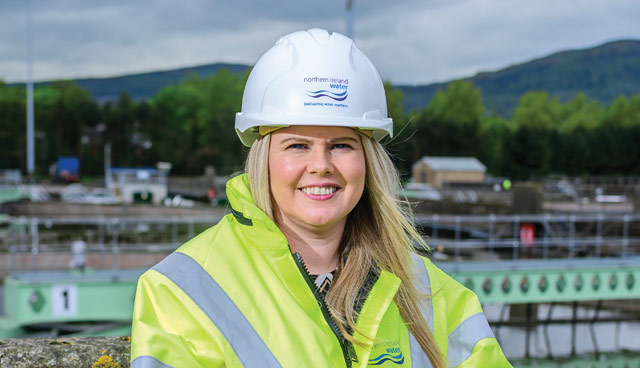NI Water: Infrastructure for economic boom or gloom

As NI Water prepares its investment requirements for its next Price Control, PC21, (for the period 2021 – 2027), Chief Executive Sara Venning talks to David Whelan about the company’s vital role in Northern Ireland’s growth and how the company’s funding, amidst increasing demands, is now critical.
There is no doubt that Northern Ireland is a great place to live and work, to visit and invest in, and over the last number of decades has made great progress on the world’s stage. The quality of our infrastructure is probably the most fundamental enabler of Northern Ireland’s growth ambitions and all of our future wealth. But with many areas of NI Water’s network already unable to meet demand and restricted levels of investment, is our water and wastewater infrastructure poised to become a disabler rather than an enabler of Northern Ireland’s future growth?
A vital enabler of growth
NI Water’s Chief Executive, Sara Venning, comments: “NI Water plays a vital role in enabling Northern Ireland’s economic growth. Take tourism for example, one of our fastest growing industries. In the last 50 years external visitors taking overnight trips to Northern Ireland has increased more than fivefold to 2.6 million and the industry has further ambitions to double current visitor numbers within the next decade. Hand in hand with this growth, we are seeing a significant number of new hotels, especially in Belfast, being constructed or opened. In fact, in 2018, the Northern Ireland Hotels Federation stated that the current growth in hotel development is the largest expansion on record.
“And tourism numbers continue to grow. 2018 was a record breaking year for cruise ship arrivals and world class attractions such as Titanic and Game of Thrones, together with world class events such as the North West 200 and The Open at Royal Portrush Golf Club this summer, are a huge draw for visitors to Northern Ireland; The Open at Royal Portrush is expected to bring over 200,000 visitors to the area during the week. Hotels, guesthouses, pubs, restaurants…they all need not just a supply of quality water but also a network that takes wastewater away, treats it and returns it safely to the environment.”
NI Water is proud to be a vital enabler of growth through the essential supply of great tasting, high quality water and the safe treatment and return to the environment of the wastewater generated.
Venning stresses the importance of NI Water’s role in enabling all sectors of the economy, especially those sectors where significant growth has and continues to happen. Highlighting the agrifood sector as a cornerstone of the Northern Ireland economy she says: “Our agrifood sector really competes on the global stage. Locally produced food and drink is now enjoyed in over 80 countries worldwide and Northern Ireland’s agrifood sector has both the ambition and the ability to grow further, targeting an increase in turnover to £7 billion and employment to reach 115,000 in 2020.
“Water is vital for agrifood producers for two crucial reasons. Firstly, for many food products, such as bakery, drinks, dairy and meats, water is a direct ingredient into the end product and not just part of a production process. Secondly, for health protection, agrifood processors and manufacturers tend not to store water, so a piped supply is essential. High quality water and reliable and resilient networks are critical to keeping the agrifood production lines running.
“And post-financial crash, it’s great to see the construction sector continuing to bounce back as well as continuing growth in the services sector too.
“Northern Ireland’s population hasn’t stood still either over the last 50 years. In 1971, there were 1.54 million people, today we have about 1.87 million; an increase of 21 per cent or to put it another way, the equivalent of around 10 additional Ballymenas. Furthermore, in just 20 years’ time, our population is expected to rise to over two million people, 30 per cent more people compared to 1971.”
Venning summarises: “All in all, Northern Ireland has made very significant economic advances and its population has grown accordingly. NI Water is proud to be a vital enabler of growth through the essential supply of great tasting, high quality water and the safe treatment and return to the environment of the wastewater generated.”
Climate change is a major impact
Increasing demand from business and population growth is not the only pressure being placed on the network’s resilience. More than 10 significant climate events in just the past couple of years are an illustration of the additional tests climate change is asking of NI Water’s water and sewage networks.
Documenting not only the severity, but also the variety of pressures that recent weather events have placed on the networks, Venning describes the difficulty of maintaining services throughout significant wind, rain and snow storms, heavy flooding and last summer’s sustained hot, dry weather period, where there was a 25 per cent increase in demand for treated water.
“What we have experienced recently is predicted to worsen,” states the Chief Executive. “In 2017, the Committee on Climate Change issued a report for Northern Ireland which found that by the end of this century, compared with the present day, Northern Ireland will see summer rainfall reducing by up to 41 per cent, winter rainfall increasing by 27 per cent and temperature increases of between 0.8 and 4.2°C.”
Restricted building and development
A growing economy, growing population and increasing severity of climate change events all culminate in significantly increased demands for water and wastewater services and investment in this vital infrastructure is needed now. Venning stresses her belief that the underground nature of most of NI Water’s some £3 billion worth of assets often means that there is a lack of awareness around the need for investment in the ageing infrastructure.
Of the close to 43,000 km of water mains and sewers operated by NI Water, 70 per cent has been in the ground for more than 50 years. Venning states that while there has been little change in most of the water mains and sewers in 50 years, in contrast, Northern Ireland is a much different place than in the early 1970s.
She continues: “Every part of our infrastructure network, whether it’s a pipe, a pump, or a treatment works has a finite capacity and most of NI Water’s assets are a legacy from decades ago. In fact, I had occasion recently to explain to a local politician that a burst we had located, was on a water main commissioned in the 1880’s and still operating as part of a network supplying some 20,000 customers. When you look at the totality of Northern Ireland’s growth, in the context of ageing water and wastewater networks that are still predominantly more than 50 years old, it’s obvious to see why the network is starting to struggle with the increasing demand and volumes.”
Venning adds: “The sewerage network is now becoming a major issue and realistic, significant investment is needed to increase its capacity and enable the continuing safe management of ever increasing volumes of wastewater and sewage. Currently, almost 30 per cent of the largest wastewater treatment works are either at, or are fast approaching their capacity. Around 70 Wastewater Treatment works with capacity issues were identified in our investment requirements for the PC15 Price Control (2015 -2021). However, the constrained level of funding made available, coupled with further annual funding cuts, means that NI Water is no longer able to accept any new connections to the sewers in over 70 areas across Northern Ireland.
The potential economic impact in these areas is easy to understand; significant restrictions for new housing, new apartments, new hotels, new factories, no office blocks, new schools, new nursing homes etc. We expect these 70 areas to increase further by the time our next round of funding becomes available in 2021.
Every part of our infrastructure network, whether it’s a pipe, a pump, or a treatment works has a finite capacity and most of NI Water’s assets are a legacy from decades ago.
Belfast needs investment now
Outlining how this concern becomes even more acute in Belfast, where the greatest demand increase is being witnessed, she adds: “Belfast wastewater treatment works was commissioned over 20 years ago and is currently operating at almost its maximum capacity. The drainage and wastewater challenges facing Belfast were identified during the business planning process for our PC15 Price Control (2015 – 2021), however, due to the sheer scale of the challenges and the level of funding needed, the Living with Water Programme (LWWP) was created in 2015. Led by DfI’s Water and Drainage Policy Division its aims are to develop a Strategic Drainage Infrastructure Plan for Belfast that provides the increased drainage and wastewater treatment capacity necessary to enable economic growth; protects against flood risk; protects the natural environment and secure the necessary funding needed. Significant investment for Belfast is needed now, to enable new sewer connections for houses, apartments, hotels, offices etc. from 2021 onwards.”
Despite mounting concern about the level of demand being placed on the ageing and underfunded infrastructure, Venning states that there is a positive; NI Water is all too aware of the challenges ahead and has identified the necessary investment requirements in its PC21 submission.
The Chief Executive has been vocal in her calls for adequate levels and greater certainty of funding. NI Water is a government-owned company and a non-departmental public body (NDPB) meaning the company is heavily reliant on government not just for the majority of its revenues but is also subject to public expenditure restrictions and often further annual cuts. Highlighting the “pivotal” nature of NI Water’s upcoming PC21 Price Control Venning explains: “NI Water will prepare a business plan setting out the investment needed and the funding required for the water and wastewater networks in the 2021 to 2027 period. The Utility Regulator will review our plan to ensure it is appropriate, efficient operations will be achieved and tariffs will remain stable. NI Water’s point of view is that adequate funding is a pre-requisite.”
Economic boom or gloom
She adds: “PC21 will be a real tipping point for NI Water in terms of its ability to continue to provide its services at the necessary level. Whilst some investment for the water network, to improve inter-connectivity from area to area, will help ensure water supply in prolonged hot dry spells of weather, it’s the lack of capacity in the wastewater network and the ability to cope both now and into the future with increasing demands that is critical to ensuring Northern Ireland’s future growth ambitions and potential.”
PC21 will be a real tipping point for NI Water in terms of its ability to continue to provide its services at the necessary level.
Venning concludes: “NI Water is good at what it does. We are delivering our best ever drinking water quality and wastewater compliance remains at near record levels. Since our formation in 2007 we’ve been able to reduce staff numbers by almost half and reduce annual running costs by £60 million.
“We work closely with councils on their development plans, we talk with business and trade organisations to understand their growth ambitions, and we work with government and regulatory bodies to make sure that we meet regulatory, environmental and legislative requirements. So we know Northern Ireland’s economic growth ambitions and potential, we know the challenges for us, we know what we need to do to ensure resilient water and wastewater networks and we have the skills to deliver it.
“Our PC21 plan sets out around £2.5 billion of capital investment needed to address capacity issues and continue providing our essential services enabling economic growth, protecting our natural environment and safeguarding the population’s health. I can’t stress enough the importance of this funding for Northern Ireland to continue to thrive. Economic boom or economic gloom, what we are planning today affects not only our lives but is inter-generational and we should take that responsibility very seriously.”
Sara Venning
Sara Venning graduated from Queen’s University Belfast with a Master of Electrical and Electronic Engineering after which she joined NIE as Customer Operations Manager. In 2010 she joined NI Water as Director of Customer Service Delivery and has been CEO since 2014. She has a passion for excellence, driving change that is transforming NI Water to becoming world class. Sara is also President of the Institute of Water, the UK water sector industry body and President of the NI WaterAid Committee, part of the national WaterAid charity working to transform lives by improving access to clean water, hygiene and sanitation in the world’s poorest communities.
Sara is married with three daughters. In her spare time she enjoys the outdoors with her family, including long walks around the beautiful settings of some of NI Water’s reservoirs.






